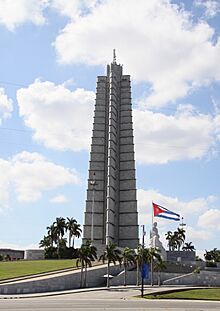José Martí Memorial facts for kids
Quick facts for kids José Martí Memorial |
|
|---|---|
 |
|
| General information | |
| Location | Havana, Cuba |
| Coordinates | 23°07′22″N 82°23′12″W / 23.12278°N 82.38667°W |
| Construction started | 1953 |
| Completed | 1958 |
| Height | |
| Top floor | 109 m (358 ft) |
| Design and construction | |
| Architect | Raoul Otero de Galarraga (chief architect and engineer) Enrique Luis Varela and Jean Labatut (associate architects) |
The José Martí Memorial (Spanish: Monumento a José Martí) is a special monument in Havana, Cuba. It honors José Martí, a very important hero for the country. You can find it in the Plaza de la Revolución (Revolution Square).
This memorial has a tall, star-shaped tower. There is also a large statue of Martí, surrounded by six columns, and beautiful gardens. It is known as the biggest monument in the world dedicated to a writer!
Contents
Building the José Martí Memorial
Designing the Monument
The memorial's tower is 109 meters (358 feet) tall. It was designed by a team of architects led by Raoul Otero de Galarraga. The tower looks like a five-pointed star. It is covered in grey marble, a beautiful stone, from a Cuban island called Isla de Pinos.
The idea for the monument came from several design contests. These competitions started way back in 1939. Different ideas were suggested. One idea was a tower with Martí's statue on top. Another was a monument similar to the Lincoln Memorial in Washington, D.C., with Martí seated inside.
In 1943, a design by architect Aquiles Maza and sculptor Juan José Sicre was chosen. However, building the monument faced some challenges.
Challenges and Changes
To build the memorial, a small chapel called the Monserrat Hermitage had to be moved. This caused delays. By 1952, when Fulgencio Batista took control of the government, construction had not yet begun.
Batista wanted to gain public support. He decided to move forward with the monument. But instead of using the winning design, he chose a different one. This design had come in third place. It was created by a group of architects, including Raoul Otero de Galarraga.
Many people were upset about this change. So, the design was changed again. The statue of Martí, sculpted by Juan José Sicre, was originally planned for the top of the tower. It was moved to the base of the tower instead.
Construction of the tower finally began in 1953. This was 100 years after José Martí was born. The marble for the monument was brought from Isla de Pinos. It was then carefully cut and polished. Martí's famous quotes were added to the walls using gold glass mosaic tiles from Venice, Italy. The memorial was finished in 1958.
What You Can See at the Memorial
The Tower and Its Views
The tower has an observation deck at the very top. This is the highest point in Havana! You can take an elevator up and see amazing views of the whole city.
Inside the ground floor of the tower, there are several rooms. Two rooms show letters, writings, and items from José Martí's life. They tell his life story. Another room shares the history of the Plaza de la Revolución. A fourth room is used to display modern art.
The center of the tower holds the elevator. Its walls are decorated with famous quotes from Martí. You can also see a copy of the sword of Simón Bolívar here. This sword was given to Fidel Castro by Hugo Chávez in 2002.
Martí's Statue and the Plaza
Outside, facing the large Plaza de la Revolución, stands an 18-meter (59-foot) white marble statue of Martí. Sculptor Juan José Sicre carved this statue right on the spot. Six shorter marble columns surround it.
The platform where the statue stands is often used as a stage. Important speeches and rallies take place here in the Plaza de la Revolución.
Many visitors enjoy going up the memorial to see the best views of Havana.
Images for kids
See also
 In Spanish: Monumento a José Martí para niños
In Spanish: Monumento a José Martí para niños
 | Audre Lorde |
 | John Berry Meachum |
 | Ferdinand Lee Barnett |











